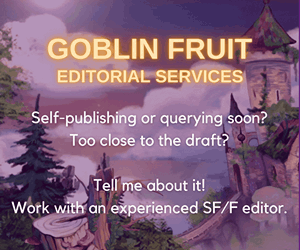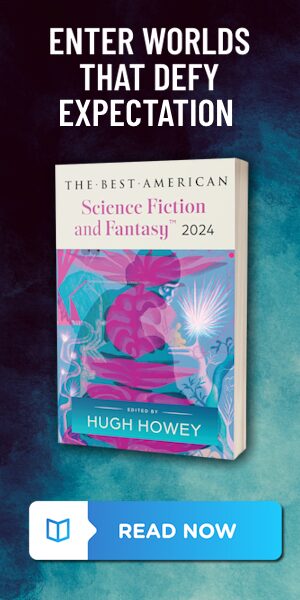“Two Motes in the Zeugma Dark” is such a fascinating story and takes us through very pertinent questions about romance, militarism and technology. What inspired you to write this story? Or what were some things that you were thinking while writing this?
“Two Motes” started out as an attempt at a cute gay rom-com: “Mech pilot takes his date on a joyride in his giant robot, only to be interrupted by an alien invasion.” However, almost as soon as I sat down to start writing, I realized what mecha stories from Gundam to Pacific Rim have already demonstrated—the only reason a civilization would have to create a superweapon in the shape of an enormous humanoid figure is shock and awe. The bipedal form is notoriously impractical for robotic locomotion at scale, let alone combat. I imagine that in this world, there is an element of homo sapiens supremacy going into the design of these robots to give Earth fighters a morale boost against their non-human enemies.
Another aspect of the story was negatively “inspired” by a personal experience in which I was trying to resist someone’s advances, but felt like I couldn’t leave. A mech cockpit would be an awful place to be trapped with someone when the good times turn bad. Once I decided to include that element, although it is mostly abstracted as an action scene, I knew there wouldn’t be a happy ending.
I find the choices about where to take a date very interesting—which in this case proves to be the mecha hanger. What do you think this choice of place tells us about this character?
I tend to start stories of this length without a plan or outline, letting the characters guide the initial scenes. I was intrigued to find out what the deal was with this guy’s unconventional seduction routine. I think Jules genuinely enjoys seeing people’s awed reactions to his unveiling of Big Blue, but there’s probably some insecurity that comes with knowing that everyone loves him for the giant robot, not himself.
One of the things that really got me interested in this story was killing something that does not feel pain (e.g. the jellyfish). Do you think that the cultural permission to violate has a direct relationship with perception of the enemy as unfeeling?
I knew a scientist who worked a lot with fish. She told me that most people would be surprised to know how much personality fish have, we just can’t perceive them as emotionally expressive. I liked that she framed it as a human problem, rather than a fish problem.
The jellies in “Two Motes” are aliens from another dimension that just happen to resemble Earth jellyfish, so it’s entirely possible that they experience things beyond our current comprehension. The bigger issue is not that we can’t understand them, it’s that we don’t even try. War is the opposite of curiosity.
Another very amazing moment was when we read the lines: “And if Jules Mercer couldn’t have his every heart’s desire, then what was the point? What was the point of having gone through any of it?” What I love about this is the relationship between pain and pleasure—that our suffering makes our desire for pleasure, regardless of its consequences, justified. Is this another theme of the story? If so, then would you expand on what your thoughts about this moment is?
Jules is a celebrity in his world, but subconsciously, he wants someone to push back, to say no. At the same time, he can’t take no for an answer. Trauma might account for his behaviour, but it’s his entitlement that makes it possible. I thought of Jules less as a militaristic soldier type and more like a brooding rockstar who is constantly being enabled by everyone around him.
I absolutely loved the ending, the precarious nature of judgement and justice. What is something that you want readers to take away from the ending?
We often think of justice as externally meted out, but sometimes it’s an internal process. In the absence of immediate punishment from a higher authority, how do you make the decision to do what’s right? How do you know what “right” is in the first place, when society is designed to insulate you from accountability? What do you do when it’s too late? These kinds of questions are rarely cleanly answered in our world, and nor are they in the story.
Is there a project you are working on currently? And if not are there any themes, objects, or news that might be tickling your fingers?
I’m currently a full-time student, so lots of artistic experiments and new things to learn about technology, science, culture, and activism. Fiction-wise, I’ve got a huge pile of drafts in various stages of revision that I think about constantly. I’m also participating in a very cool initiative called Manufactured Ecosystems< where I’ll be working with scientists and scholars to write climate fiction inspired by biomimicry. You can check out my previous work here: saganyee.com.
As for Jules and Scarpe, I have a feeling I’m not quite finished with these two characters. Especially Elliott, the engineer with a troubled conscience, who we only see through Jules’ uncharitable eyes. I wrote the first draft of “Two Motes” years ago, but I still find myself wondering what happened to Scarpe after the story ends, and how that experience might have changed him…
Enjoyed this article? Consider supporting us via one of the following methods:










